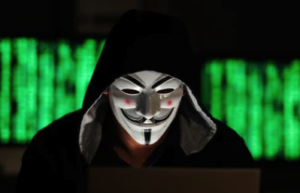Anonymous, often referred to as an “Internet group,” is a mysterious and loosely organized collective of individuals who have made a significant impact on the digital landscape. With their iconic Guy Fawkes masks and a wide array of unconventional tactics, Anonymous is both celebrated and vilified. In this article, we’ll provide a simple and straightforward definition of Anonymous, shedding light on who they are, what they stand for, and their unique place in the digital world.

Who Are They?
Anonymous is not a traditional organization with members and leaders; instead, it’s a loosely affiliated and leaderless collective. People from all walks of life, backgrounds, and skill sets come together under the banner of Anonymous to promote various causes, often related to free speech, government transparency, and social justice. Anonymity is a central theme, and participants hide their true identities to protect themselves and allow for more open and honest dissent.
The Guy Fawkes Connection
If you’ve seen individuals wearing Guy Fawkes masks at protests or online, they’re likely affiliated with Anonymous. The Guy Fawkes mask, made famous by the graphic novel and film “V for Vendetta,” represents resistance against oppressive authority. This mask conceals the wearer’s identity and symbolizes the power of the collective. It’s not just a costume; it’s a statement of defiance and unity.
Diverse Motivations
One crucial aspect of Anonymous is that its members have diverse motivations. Some engage in hacktivism to promote political or social causes. Others participate for the thrill of hacking or to express their discontent with the status quo. This wide range of motives makes it difficult to generalize the group’s actions.
Digital Activism and Hacktivism
Anonymous is known for its digital activism, with hacktivism being a prominent part of their activities. This includes unconventional tactics like distributed denial of service (DDoS) attacks, website defacement, and data breaches. These actions often grab headlines, but it’s essential to understand that Anonymous also engages in traditional activism by supporting movements, organizing protests, and advocating for change.
Operation Chanology
One of the most well-known operations conducted by Anonymous is “Operation Chanology.” This operation targeted the Church of Scientology in 2008, in response to the church’s efforts to remove a video featuring Tom Cruise. Anonymous organized protests, distributed informational materials, and launched DDoS attacks against Scientology websites. The operation stirred ethical debates about the group’s actions but showcased their potential influence.
Support for WikiLeaks
In 2010, Anonymous gained widespread attention for supporting WikiLeaks and its founder, Julian Assange. When several organizations, including PayPal and MasterCard, withdrew their support for WikiLeaks, Anonymous launched “Operation Payback.” This campaign featured DDoS attacks against the companies’ websites, demonstrating the group’s ability to mobilize in support of causes they believed in.
The Million Mask March
Every year on November 5th, Anonymous supporters and activists participate in the Million Mask March. During this event, people don Guy Fawkes masks and take to the streets to protest government surveillance, censorship, and corporate influence. The march provides a platform for individuals to voice their concerns on a wide range of issues. While generally peaceful, some cities have seen clashes with law enforcement.
Ethical and Legal Questions
Anonymous’s activities have raised significant ethical and legal questions. Some view them as champions of free speech and transparency, while others consider their actions illegal and unethical. The group’s use of DDoS attacks, for instance, has sparked debates about their legality and morality. The decentralized structure of Anonymous makes it difficult to hold individuals accountable for their actions.
Shifting Focus
Over the years, Anonymous has expanded its focus beyond traditional hacktivism. While hacktivism remains a significant part of their activities, they have also diversified by advocating for digital privacy and security. Additionally, they support global protests and advocate for social and political change through more conventional means, like rallies and demonstrations.
Conclusion
In simple terms, Anonymous is a diverse and ever-evolving collective of individuals with a shared commitment to digital activism. Their iconic Guy Fawkes masks and unconventional tactics have made them a prominent presence in the digital world. While their hacktivist activities often grab headlines, they also engage in a wide range of digital activism, such as supporting movements, advocating for digital rights, and promoting social change through protests and rallies.
Anonymous is not a uniform entity; it consists of people with a variety of motivations. Some see them as champions of free speech and transparency, while others view them as cybercriminals who engage in illegal activities. The decentralized nature of the group allows them to adapt to different causes and concerns.
Ultimately, understanding Anonymous requires acknowledging the group’s multifaceted nature and their unique role in shaping conversations surrounding online activism, digital rights, and the power of collective action in the digital age.